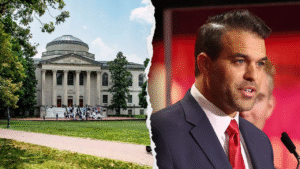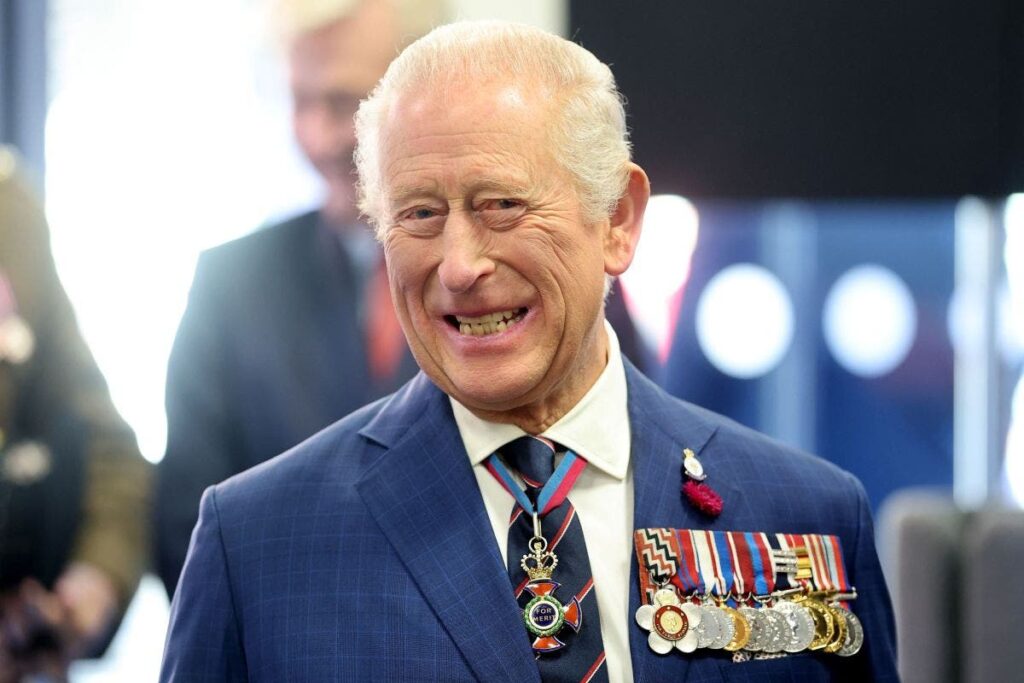King Charles III’s monarchy is—for the first time in history—reigning over a generation of children whose parents are at best divided on whether to abolish the royal family and will likely soon be in favor.
Royal popularity has been declining in recent years, particularly since 2021, when Prince Harry and Meghan Markle launched a public feud against the palace.
And so far, the focus has been on growing disapproval among Gen Zers, who are currently defined as spanning 13 to 28 years old, with dates of birth ranging from 1997 to 2012.
However, new data from a major U.K. study serves as a stark warning for royal aides that the problem could be about to get significantly worse.
And that’s because the rot appears to be spreading up the age range to the point that British first-time parents are now more likely to support axing the crown than ever before.
In other words, Gen Z may seem hostile now, but they were raised by broadly pro-Monarchy parents before the popularity collapse of 2021.
The big question is whether those who follow them will change course, with royalist hopes resting on Prince George, Princess Charlotte and Prince Louis’ generation to usher in a renaissance.
Together with their peers, they make up Gen Alpha, born between 2010 and 2024, and they are being raised by millennial parents, of Prince William and Princess Kate’s age. Among this demographic, Brits are now just as likely to support switching to a democratically elected head of state as keeping the king when only given those options.
Tracking data over time can be challenging due to the changing nature of how questions are phrased by pollsters. However, all the data Newsweek has been able to uncover points to this being the first time in history that a generation of British children has not been raised by pro-Monarchy parents.
What makes the data even more interesting is that this same cohort of parents will have been teenagers during the last period of royal cataclysm, around the messy breakup of King Charles’ marriage to Princess Diana and the period after her death.
However, to fully understand the gradual erosion of public support for the Monarchy over several decades, it is first necessary to consider its standing in the 1980s, before either crisis had unfolded.
1980s Britain and the Princess Diana Era
The National Center for Social Research has been collecting data on the Monarchy for years via the British Social Attitudes Survey, and is therefore able to offer a blow-by-blow account of changing perspectives.
In 1983, the picture was clear—65 percent of Brits thought it was “very important” to have a monarchy, and another roughly 21 percent said “quite important,” giving an overall figure of 86 percent who were royalists.
This compared to 8 percent who said “not very important,” just under 3 percent who said “not at all” and just over 3 percent who wanted to abolish the monarchy.
In the 1990s, however, Princess Diana went public about Charles’ affair with Queen Camilla, their marriage disintegrated, and in 1997, she died in a car crash in Paris, having been stripped of the title, Her Royal Highness.
During this era, the percentage answering “very important” collapsed to what was, at the time, a historic low of 27.7 percent in 1998, although the numbers for “quite important” rose. This meant there was still a majority support for the monarchy, with 64 percent saying either very or quite important, 24 percent saying either not very or not at all important, and 10 percent saying abolish.
Polling for The Guardian again recorded a popularity crisis for the royals in 2000, but as Newsweek has shown before, it was largely fueled by disinterest rather than actual republican sentiment. Surveys at the time were asking indirect questions, such as whether Britain would be better off without the monarchy.
And—unlike now—opposition dissolved when pollsters asked a direct question about whether Britain should abolish the monarchy in favor of an elected head of state. Ipsos did just that in June 2000, when 70 percent wanted to keep the crown compared to 19 percent who wanted the U.K. to become a republic.
In summary, two key observations from the Diana era are that it represented the disintegration of the hardcore monarchist position but not particularly a surge in support for republicanism.
Prince William, Princess Kate and Rebirth
Disinterest in the monarchy did not last, however, as the fairy-tale romance between Prince William and Princess Kate rekindled interest in the royals.
The headline numbers improved, but significantly, they did not actually recover the sky-high support they had enjoyed in 1983, before the PR bomb went off.
Royal popularity peaked in 2012, a year after William and Kate’s wedding and the same year as Queen Elizabeth II’s Diamond Jubilee, when the British Social Attitudes Survey recorded 75 percent who felt the monarchy was either “very” or “quite” important.
However, this was made up of 46 percent who said “very important,” a significant drop compared to 1983, when it was 65 percent. The royalist position was propped up by a further 30 percent who said “quite important.” In other words, at its post-Diana zenith, the support for the monarchy was there but had gone soft.
That’s crucial because it is this generation—young in the 90s and 2000s—who have become the Millennial parents of today. And they are now in turn raising Gen Alpha.
Harry, Meghan and the Royal Bombshells
If the Diana era brought in a collapse among the hardened royalists, the Harry and Meghan era introduced a surge in support for abolition among young people.
When pollsters YouGov first noticed this trend, and Newsweek also began writing about it, the malaise was predominantly confined to 18 to 24-year-olds. Even among 25 to 49-year-olds, 53 percent felt Britain should continue to have a monarchy, while 27 percent wanted an elected head of state.
However, the British Social Attitudes Survey appears to indicate that the Monarchy is now a controversial subject all the way up to at least age 44 and likely higher. One crucial distinction, though, comes from how the question is phrased.
The social attitudes survey records 24 percent who view the Monarchy as “very important” and 27 percent who said “quite important,” giving a headline number of 51 percent, the lowest on record.
Another 20 percent said “not very important,” 11 percent “not at all” and 15 percent wanted to abolish. That may not sound too bad, but what should be more worrying to the palace is that, when asked a more direct question about whether to scrap the crown, support for republicanism surged. That is a major difference compared to the 90s and 2000s.
While 58 percent wanted to keep the royals, 38 percent wanted a democratically elected head of state when only given those options, plus “don’t know” and “prefer not to answer.”
And when the data for that question are broken down by age, the numbers get worse still. Among 16 to 24-year-olds, 67 percent wanted to abolish compared to 30 percent who would keep the crown.
For 25 to 34 year olds, 53 percent were republicans compared to 45 percent royalist and 35 to 44-year-olds were almost exactly split, with 48 percent in favor of abolition and 47 percent wanting to keep the royals.
The average age to become a new parent in Britain was, at the time of the 2021 census, 29 years old, meaning the parents of Gen Alpha children will likely be highly—but not exclusively—concentrated among the 35 to 44 age group with chunks in the age ranges on either side.
Even among the broader 35 to 54 range, 53 percent came down on the pro-monarchy side compared to 42 percent in favor of an elected head of state.
It is only among Brits over the age of 55 that the 1980’s perspective on monarchy is restored, with 79 percent in favor of keeping the monarchy compared to 17 percent against. And those are all people born at the latest in 1970, who were raised during the era when support for the monarchy was at its most committed.
Some might think they have doggedly held onto their pro-monarchy perspective precisely because of the hardened royalists who raised them.
The data can neither confirm nor dispute that. However, if it is true, then that sounds warning sirens about how Gen Alpha and their royal skeptic parents will shape the future of the crown.
Graham Smith, chief executive of Republic, told Newsweek: “They’re on a spiral downwards and their big problem is they haven’t really changed much over the years and they haven’t got anything new to pull out of the hat. So it’s not going to turn around and go back the other way.
“In the last decade and a half we’ve had two big weddings, two jubilees and a coronation and the queen’s funeral and it’s not bringing back any kind of level of support at all. It’s continuing to drift downwards.”
Beyond Harry and Meghan’s royal bombshells, Prince Andrew and his friendship with Jeffrey Epstein have been a major scandal for the monarchy, playing out now over a decade and a half, since 2010, when they were photographed walking through Central Park together. Epstein had been convicted of soliciting a minor for prostitution two years earlier.
At its height, Virginia Giuffre sued Prince Andrew in New York, accusing him of sexually assaulting her when she was a 17-year-old Epstein sex trafficking victim. He has always denied the allegations but settled the civil case out of court in 2022 for an undisclosed sum while denying liability. She died this year after what a family statement described as a suicide.
“Prince Andrew is just damaging the whole family because it keeps coming back,” Smith said. “Sexual offences are so toxic to a brand, if you can put it like that. It’s obviously going to do a huge amount of damage, and of course the Meghan thing. Whichever side you fall on, most people would look at it and think it’s all a nonsense. The other royals… William, isn’t seen an awful lot and is exceptionally dull.”
The slow collapse in support for the royals has ebbed and flowed over decades, and it may be many more years before talk of Britain actually abolishing the monarch becomes in any way serious.
It should also be remembered that even if such a time does come, Charles does have a fail-safe. It is one thing to lose popular support, but Britain can only abolish the monarchy if a Prime Minister has the political will to do so.
And in that respect, Donald Trump’s recent state visit may well have sent a key message to the political class that the royals are still Britain’s ace in the pack on the global stage.
Do you have a question about King Charles III and Queen Camilla, Prince William and Princess Kate, Meghan Markle and Prince Harry, or their family that you would like our experienced royal correspondents to answer? Email royals@newsweek.com. We’d love to hear from you.
Read the full article here














